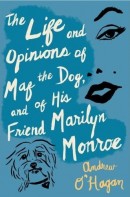 Acclaimed novelist Andrew O’Hagan’s latest is a curveball narrated by Marilyn Monroe’s dog. The facts seem to be that Frank Sinatra gave her a pup, and that Monroe playfully named him Mafia Honey (Maf for short). O’Hagan takes this premise and runs with it, birthing the terrier on a Scottish farm and sending him on a quick tour of Bloomsbury before landing him in Marilyn’s stateside bosom.
Acclaimed novelist Andrew O’Hagan’s latest is a curveball narrated by Marilyn Monroe’s dog. The facts seem to be that Frank Sinatra gave her a pup, and that Monroe playfully named him Mafia Honey (Maf for short). O’Hagan takes this premise and runs with it, birthing the terrier on a Scottish farm and sending him on a quick tour of Bloomsbury before landing him in Marilyn’s stateside bosom.
Critics are skittish. In the Guardian, Sarah Churchwell is ultimately forgiving of the conceit: “Faced with a title as arch as [this one], the staunchest critical objectivity might fail,” she writes. But eventually, the novel “offers a whimsical, sometimes strained, occasionally charming, series of riffs on its chosen themes: not only Marilyn, fame, loneliness and death; but also literature, including the literary pedigree of stories about dogs; cultural pretension, in the form of literary New York and Freudian psychoanalysis; politics and democracy; and even America itself.”
In the New York Times, Robin Romm is perhaps most taken by the larger themes addressed by the dog:
Maf has no shortage of opinions. He’s a devout Trotskyist, a proponent of the working class and — because O’Hagan is too keen a writer to make even a dog pedantic or one-dimensional — a bit of a pompous snob. . . . the relentless historical insights and allusions do more than underscore Maf’s pretensions. They also reveal an immigrant’s anxiety and insecurity with social position and status. No matter that he’s Marilyn’s aristocratic Maltese, he was still whelped on a tenant farm. No amount of reinvention can truly hide what lies beneath. Some part of Mafia Honey will always remain “Sizzle” or simply “Maltese,” just as Natalie Wood will remain Natalia Nikolaevna Zakharenko and Marilyn Monroe will remain Norma Jeane Baker. The old world, with its hints of poverty and earthiness, collides with the new. The clash causes spiritual conflict, and no one struggles more than Marilyn.
Like everyone else, Louis Bayard (in the Washington Post) praises O’Hagan’s considerable prose talent, but is the most clearly displeased with the uses to which it’s put here, particularly the dog himself, and how he acts as a mouthpiece for O’Hagan’s erudition: “He’s the kind of pedantic pooch who can’t even sit for a spell in Central Park without conjuring up visions of the Ice Age and dinosaurs and the Dutch settlers. . . . and if you’re anything like me, you’ll be reaching for the nearest muzzle or, failing that, a rolled-up newspaper.”
Nodding to the book’s advance blurbs from the UK, Bayard writes: “It is brilliant, says Roddy Doyle, and moving and very funny. Edna O’Brien predicts it will become a classic. Colm Toibin loves it, too. What does it say about me, I wonder, that I found it a grinding, irksome bore?”
Last (and, in this case, least), Michiko Kakutani makes the highly questionable choice to review the book in the voice of Brian, the dog from the sitcom The Family Guy. (“Like me, Maf is a credit to his species.” And so forth.)
The Life and Opinions of Maf the Dog, and of His Friend Marilyn Monroe by Andrew O’Hagan
Houghton Mifflin, 288 pp., $24.00

